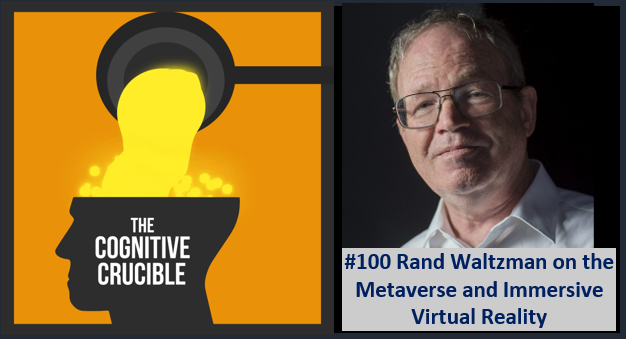The following article is an original work published by the Information Professionals Association. Opinions expressed by authors are their own, and do not necessarily reflect the views of or endorsement by the Information Professionals Association.
By John Bicknell, with support from Paul Lieber
This past month, the Information Professionals Association’s (IPA) Cognitive Crucible podcast released its 100th episode. Looking back at #1-to-#100 – both culminating in discussions with close friend and colleague Dr. Rand Waltzman – there were some incredible experiences along the way. I spent time with a diverse mix of scholars, practitioners, and professionals literally across the globe and on an equally broad array of topics which comprise cognitive security. In the show’s first century, we’ve covered policy and practice, the metaverse and cybernetics, wicked problems and risk, information influence and cognitive immunology, deepfakes, xenotypes and archetypes, and so many more fascinating explorations on how humans reason, well, about reasoning. I hope you found this as engaging as I did! (See the end of this article for a catalog of persistent themes and episodes which align to these themes).
Perhaps the most amazing discovery happened between my ears. As someone who came to IPA and this podcast after 20 years as an officer with the U.S. Marine Corps, I did so with limited direct exposure to information operations. Instead, my military career centered around people and processes, with my advanced degree (Naval Postgraduate School) not on persuasion but rather human capital supply chain challenges. The company I founded (More Cowbell Unlimited) focuses on the creation and application of process technologies to explain ecosystems of interest and serve up insights for better, faster decisions.
Still, omnipresent was and remains a fascination and subsequent personal and emotional investment in the various communities comprising the information professionals space (i.e., journalism, cyber, strategic communications, electronic warfare, PSYOP, neuroscience, etc.). I joined the IPA Board and helped launch the Cognitive Crucible to continue to scratch this itch. Through the podcast, one can say I scratched it 100 times over. And I’m still itchy.

Equally important is what happened behind the scenes of the Cognitive Crucible during all this. The list of guests for 1-100 not only span the entire cognitive security landscape but arguably also its ideological, to include political, perspectives. While the Cognitive Crucible will never endorse a particular political view or person, we made it a goal to include any/all guests with a proven and potentially valuable contribution to our audience. Even ones that may ruffle feathers. While a neutral perspective will occasionally create hullabaloo, it’s what arguably keeps the content interesting and allowed us to reach that 100th episode with people still tuning in. I’d like to thank my IPA colleagues for always ensuring this neutrality was present and expanding my own thoughts on the art of the possible in exploring and discussing cognitive security.
At the end of the day, perhaps Susan Coyle, who leads the Information Warfare Division for the Australian Defence Force put it best:
“I absolutely agree with the podcast on the importance of nurturing partnerships. It’s absolutely vital.”
Partnerships is what IPA and the Cognitive Crucible is all about. We launched the podcast to expand our reach and diversity in content and audience, and we’ve arguably done just that. Buoyed by additional efforts such as a member Slack channel, events like Phoenix Challenge, a certification program, and additional outreach to international partners like Susan, it’s been a strong year for IPA and in advancing the worldwide dialog on cognitive security. I’m very proud of the exponentially increasing numbers of both podcast listeners and IPA members. Keep listening, friends!
Well, onward to the next 100. Going forward, I want the podcast to stimulate more innovation, more ideas, and research. Ultimately, I want IPA to develop into a cognitive security research generation engine. I want more readouts from high school, college, and graduate student projects–like our episodes with Courtney Cano and Kaitlyn Tierney on Diverting Hate and Cassandra Brooker on the Effectiveness of Influence Activities. To this end, I’ve just started asking guests about research topics they believe are necessary. IPA will catalog these topics for the community to consider and suggest that professors and students alike consider taking a crack at them.
Ambitious, perhaps…but I’m optimistic. Based on listener feedback I’ve received, the Cognitive Crucible is seen by many as an informal learning or professional development channel. Something like an old-school watercooler or brown bag lunch discussion where a weekly podcast episode is debated. That’s awesome, and I hope it continues. Please keep listening, learning and debating. And thanks for your time and ears.
Warmly,
John Bicknell
VP, IPA
Host, Cognitive Crucible
Themes
Here are some major themes, along with links to episodes which touch on these themes:
It’s a “We” (Global) Problem
Time and again, experts discuss the need for partnership in order to collectively orient and counter cognitive security challenges. Episodes which discuss partnership and the global nature of the problem include:
- #11 Jacob Udo-Udo Jacob on Social Norms, Disarmament, Demobilization and Reintegration
- #13 Brian Russell on Behind Enemy Lines
- #24 John Davis on Modern Warfare, Teamwork, and Commercial Cognitive Security
- #38 Lori Reynolds on Operations in the Information Environment
- #41 Toomas Ilves on the Estonian Perspective
- #46 Pat Ryder on Public Affairs and Strategic Communications
- #60 Chan Swallow on Air Force Studies, Analyses and Assessments
- #54 Steve Parode on the Information Environment
Trade Offs, Governance, and Legislation
The West faces excruciating tradeoffs–especially between privacy and security. Governance and legislative actions are critical to manage this challenge. In the episode with Mike Vickers, he describes the tradeoff between “security and liberty:”
“So there’s a red line there about liberty that you really don’t want to cross, and if we’ve learned anything in the past few years, it’s that even our democracy is more fragile than we would like to think and we need to find ways to strengthen that not weaken it.”
Other episodes which discuss tradeoffs, governance, and legislation include:
- #21 Pete Villano on Congressional Authorities
- #53 Clint Watts on Domestic Extremism
- #49 Matt Armstrong on the Smith-Mundt Act
- #56 Bob Jones on Governance
- #74 Elham Tabassi on NIST, Technology Standards, and Trust
- #84 Suzanne Spaulding on Disinformation, the Foreign Malign Influence Center, and Civics
- #93 Todd Huntley on Information Operations and the Law
- #98 Arun Seraphin on the SASC and Emerging Technology
- #100 Rand Waltzman on the Metaverse and Immersive Virtual Reality
Complexity & Cybernetics
Complexity is an enduring feature of the national security landscape for the foreseeable future. Governments and military organizations need to transition from linear, kinetic geopolitical approaches to a continual competition mindset. Complex Systems scholar, Yaneer Bar-Yam, asserts:
“The only system that we can really describe in statistics is a system of independent components or a system where all of the components are completely dependent on each other … So it’s really astounding that we’ve made as much progress as we have in understanding the world, but, again, the reason is that statistics captures certain aspects of a system and that’s really powerful and important and not to be denied. But, if we want to go beyond those specific properties of a system, we really need much better and more comprehensive mathematical tools… Those mathematical tools are linked to concepts and ideas that are important in how we think about the world, and that’s super important for everything that we do–not just the scientific mathematical description but indeed how we interact with the world overall.”
Other episodes which discuss complexity and cybernetics include:
- #7 Randy Rosin on Russia and Applied Cybernetics
- #31 Beebe on Wicked Problems
- #47 Yaneer Bar-Yam on Complex Systems and the War on Ideals
- #43 Schuck on C2 and the C-OODA loop
- #57 Carley on Social Cybersecurity and the BEND Framework
- #72 Noah Komnick on Cybernetics and the Age of Complexity
- #73 Ori Brafman on The Starfish, Spider, and Resilient Societies
- #85 Josh Kerbel on Complexity and Anticipatory Intelligence
Neuroscience & Technology
It doesn’t get more “cognitive” than neuroscience, and we have had several episodes with thought leaders in this domain. Technology plays a major role in affecting decision making, as well. Here are some episodes to check out:
- #5 Robert Thibadeau on Lies
- #12 Johannes Tammekänd on Deep Fakes
- #20 Chris Paul on the Firehose of Falsehood
- #42 Chudoba on NGA Tech Acquisition and “Moonshot”
- #65 Sean Guillory on Cognitive Neuroscience Applications
- #68 Andy Norman on Cognitive Immunology
- #77 Paul Lopata on Quantum
- #69 Matt Venhaus on ARLIS & the Cognitive Security Proving Ground
- #80 Hank Thomas on VC Tech interface w National Security
Interdisciplinary, Innovation, and Futurism
I like the parable of Three Blind Men and an Elephant. Each person has a hand on a different part of the beast but does not see the whole problem. One man feels the trunk and describes a snake-like phenomenon. Another feels a leg and thinks it’s a tree. The third grabs the elephant’s tail and thinks it is a rope. Like multi-domain sensors, the three men are reporting a somewhat accurate aspect of the larger ecosystem. But, only when we put the sensor outputs together may we understand the whole. What has a snake-like component, a tree-like component, and a rope-like component? Answer: an elephant. Interdisciplinary research helps with the information problem by bringing innovation and new perspectives–sometimes even fringe concepts–into the discussion space. Here are some episodes to check out:
- #6 Ben Riley on Innovation and Risk
- #14 BDJ on Threatcasting
- #16 Boyd Brown on Deception Technology
- #18 Tom Sear on Xenowar
- #33 Cole on FICINT and the Cognitive Warfighting Domain
- #34 Emma Chiu on Global Trends and Market Intelligence
- #36 Ghose on Disruptive Innovation and Entrepreneurship
- #73 Ori Brafman on The Starfish, Spider, and Resilient Societies
- #76 Yuval Levin on the Constitution & Institutions
- #62 Jonathan Rauch on the Constitution of Knowledge
- #34 Emma Chiu on Global Trends and Market Intelligence
- #59 Mark Moffett on Societies, Identity, and Belonging
- #83 Joseph Lee on Jung and Archetypes
- #91 Denver Dill on the Arts
About the author
John Bicknell is CEO & Founder of More Cowbell Unlimited, Inc. His firm provides cloud process technologies as big as the Information Age in support of national security and industry. John is a national security thought leader and passionate analytics visionary. He has held numerous analytics practitioner and leadership positions–helping businesses and government organizations derive actionable insights and make better decisions using data. John served worldwide for twenty years as a Marine before retiring in 2010 as a Lieutenant Colonel. In his corporate career, he operationalized an Analytics Center of Excellence for a large EdTech firm, among other accomplishments. John is a member of the Military Operations Research Society (MORS) and the InfraGard partnership between the FBI and members of the private sector. His Master’s degree from the Naval Postgraduate School emphasizes econometrics and operations research. John lives with his family in the Pacific Northwest. He is also the host of IPA’s Cognitive Crucible Podcast.

